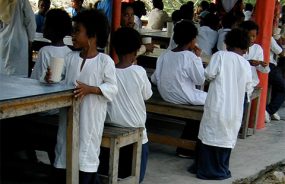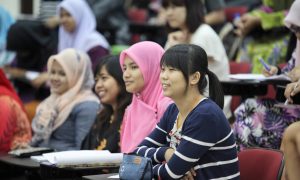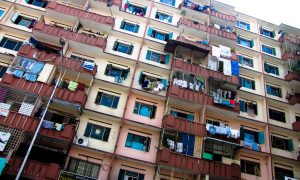A fever. Shallow breathing. Racked by coughing. In May and June 2019, at least 15 Batek indigenous people of mainland Malaysia’s Kelantan state died with such symptoms. Some perished in the rainforest that had always sheltered their people, others in a settlement surrounded by oil palm plantations. A few passed away in hospital after the health crisis became known to the government.
Orang Asli, the indigenous peoples of mainland Malaysia, number less than 200,000 — under 1% of the country’s population. They include about 2,000 members of the Batek (also spelled Bateq) language group, who tend to have dark skin and curly hair. DNA studies indicate a Batek “deep ancestry” of at least 50,000 years in the region.
Dating back to post-WW2 counterinsurgency measures, Malaysian government policy has forced most Orang Asli into settlements, usually with dire results. But Bateks are some of the last roving forest foragers in the world.
With mainland Malaysia severely deforested in recent decades, Bateks now depend on protected forests, particularly Taman Negara (the National Park, their ancestral land) where they gather plants and hunt park-limited types of animals. They help prevent poaching, work as guides or build park structures. They also engage in unauthorised gathering of valuable fragrant gharu resin.
As many as 300 semi-nomadic Bateks are based near Kelantan State’s Kuala Koh entrance to Taman Negara in a small settlement of government-provided buildings and their own bamboo/tarp lean-tos. Except for the park access, the settlement is surrounded by the monoculture of erosion-prone Federal Land Development Authority (FELDA) oil palm plantations.
At Kuala Koh, the Bateks were not isolated from other communities, including Indonesian migrant oil palm and rubber laborers. It is not a particularly remote area. When I visited in 2008 while researching my book “The Wind in the Bamboo” it was only a 2 hour drive from the busy town of Gua Musang.
I sought out Chinloy, a woman who as a teenager in 1975 single-handedly shifted anthropology’s gender preconceptions (“men hunt, women gather”) when American field workers Kirk and Karen Endicott observed her skill at blowpipe hunting. In addition to their gender egalitarianism, Bateks are anthropologically significant for having a culture of nonviolence.
When I met Chinloy she was a mother of eight, including girls who hunted in the park. Batek students went to school in an oil palm workers’ village and returned home to the edge of the forest in the afternoon. I wrote that “the children seemed well-fed and well-dressed.”
Colin Nicholas, director of the Center for Orang Asli Concerns (COAC) has described the pre-2014 Kuala Koh Bateks as “healthy and happy people. And still in full control of their lives.”
Since then their circumstances have been severely reduced. A government program provided a piped water system that never worked. Catastrophic deforestation-related flooding in 2014-15 badly affected the river-dependent Bateks. According to COAC, “Their physical and mental health declined rapidly after that. And never really recovered.”
The Kuala Koh park entrance was described on TripAdvisor in 2018 as “dreary miles of oil palm plantations, unending… The river is muddy, forests disturbed…A heavy and oppressive atmosphere of decay”. As of January 2019, most of the children have dropped out of school because leaving their families for boarding schools has become the only option.
Dr Steven Chow of the Federation of Private Medical Practitioners Associations Malaysia was quoted in The Guardian about his April 2019 visit to the Kuala Koh Bateks: “Their water supply was virtually non-existent, sanitation was bad and they were suffering from all sorts of infections, showing their immune systems were very vulnerable”. The Bateks complained of an itching skin infection in March-April 2019.
When word of Batek deaths emerged in June, the press proclaimed a “mysterious disease” as if “the jungle” had perhaps produced some Ebola-like virus. Then pneumonia was identified as cause of death in some cases.
On 17 June, Health Minister Dzulkefly Ahmad issued the official diagnosis of a measles outbreak. Nothing tropical “jungle” about that, just unvaccinated or under-vaccinated children and adults with compromised immunity exposed to measles and succumbing to related pneumonia.
Although some Orang Asli have traditional beliefs opposed to piercing skin, Kuala Koh’s 61.5% initial vaccination rate and 30% second dose makes it seem likely that lack of access and medical staff neglecting follow-up inoculations were more of a factor than Batek reluctance to get the shots. Malaysia’s overall measles vaccination rate had sunk to 89% in 2018, when nearly 2,000 cases of the illness, with 6 deaths, were reported.
It seems that a variety of factors contributed to low immunity: scarcity of protein and other food shortages, contaminated water. Not only were the Kuala Koh Bateks living in proximity to the FELDA oil palm plantations and rubber plantations with agricultural chemical runoff affecting soil and water, there were iron and manganese mining operations nearby. A manganese mine was still functioning despite having its licence revoked in 2017 for environmental noncompliance.
The official measles diagnosis followed the Malaysian government’s denial that environmental problems were involved in the deaths. Deputy Prime Minister Wan Azizah Wan Ismail stated that a water sample test found no pollution from agriculture or mining.
Scepticism remains about those results. When local charity group Sahabat Jariah first brought outside attention to the Kuala Koh Batek deaths, it cited a university study of “the water in the surrounding rivers” which found “all sources of water are contaminated with metals, arsenic and agricultural chemicals.”
The Association for the Protection of Natural Heritage of Malaysia filmed some Kuala Koh Batek elder women, including Chinloy, speaking about the illness. One of them (as translated in The Malaysian Insight) said, “Before logging and mining commenced, nobody was ill or dead. Young people have died, babies in the womb also died.”
Chinloy’s husband Hamden Keladi, a respected community leader and three of their children, Laila, Romi and Din, died in the outbreak.
“I don’t know what has befallen me. I’ve never seen something like this before,” she told The Star newspaper, “I cry. I watch their graves.” Chinloy mentioned their living conditions: “When we don’t have water, we will use whatever we can get, including run-offs from an oil palm plantation.”
The Bateks clinging to the edge of the park are literally marginalised people. An 11 June COAC statement called the Batek deaths “a direct outcome of what happens when an indigenous community’s rights to the customary lands are not recognised, and the land destroyed and depleted in the name of progress and development.”
Orang Asli customary land rights are supposed to be protected by law but are instead constantly disregarded by Kelantan’s timber, agribusiness and mining interests. Temiar Orang Asli in the Gua Musang area have resorted to a series of blockades to prevent logging. In January 2019, Malaysia’s federal government filed a court case against the Kelantan state government for its failure to preserve Temiar traditional land from deforestation by plantation companies.
Now Bateks are returning home from hospital stays equipped with disposable masks. A charity announced they’ll furnish the Kuala Koh settlement with a solar powered water treatment system. Concerned Malaysians donated food and other supplies. The standard of healthcare will improve for a while.
An education in captivity
Edith Mirante reports on a Malaysian boarding school escape with tragic consequences.
Instead of sporadic, shocked attention driven by avoidable deaths, Malaysia’s Orang Asli communities need actual political and economic empowerment for their men and women. The Bateks, indigenous people of particular importance for their gender egalitarianism, nonviolence and botanical knowledge, must be included in all decisions affecting their lives.
Hamden Keladi told researcher Ivan Tacey back in 2008, “Our children when they live in the forest know how to live in the forest. They know how to hunt and find medicine in the forest”. With their expertise, the Bateks should be involved in the management of Taman Negara and supervise reforestation of their adjacent ancestral lands.
 Facebook
Facebook  Twitter
Twitter  Soundcloud
Soundcloud  Youtube
Youtube  Rss
Rss 



